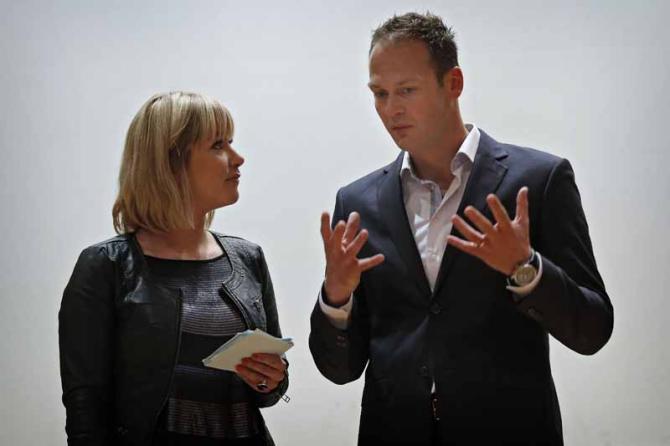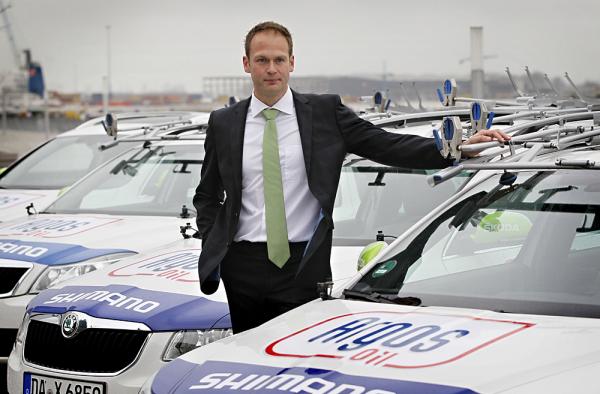Spekenbrink: The sport of cycling has to change
Argos-Shimano maps out path for a cleaner cycling



Argos-Shimano team boss Iwan Spekenbrink has called for reform of the structure of professional cycling, and stressed that riders who are caught doping in the future should receive a zero tolerance response. Spekenbrink's reform consists of three main areas: the fight against anti-doping, the race calendar and how teams should manage riders.
Spekenbrink has built the Argos-Shimano team up from the Pro Continental ranks into a newly established power within the WorldTour. The team has a strict anti-doping policy and have shied away from signing controversial athletes in the past. Marcel Kittel and John Degenkolb are arguably the most established stars, but Spekenbrink has created a squad that blends experience and youthful promise. However it's a team without egos, where riders appear to fit into part of Spekenbrink's jigsaw.
His recent comments are set against a backdrop of disillusionment within the sport, with a number of sponsors having pulled out and a string of doping confessions.
"In my opinion what we need to do in cycling is organise a better structure in which the top priority is the make the sport more credible. When we're thinking about having a new structure within the sport that should be the first and more important criteria," Spekenbrink told Cyclingnews.
"There are three options. One we just don't talk about doping. The second is that we have a mix of priorities with anti-doping, globalisation and business are important and the last option is that we create a structure within the sport that eradicates doping from the sport. In my opinion it has to be the last option.
"There's no other way to deal with doping other than tackling it head on and trying to get rid of it. Otherwise every five years you're looking at a new scandal."
Last fall cycling had to endure the fallout from the US Postal investigation carried out by USADA. It not only cast doubts surrounding one team or one generation of riders but the complete governance of the sport. The UCI are still facing allegations of corruption while their flip flop stance over USADA's jurisdiction did little to improve their credibility.
The latest race content, interviews, features, reviews and expert buying guides, direct to your inbox!
"We have to understand how the doping culture could have happened in the first place. This all comes back to the structure though. If you see that drugs like EPO, blood boosting, AICAR - the new drug we have to be wary of - are performance enhancing, we have to look at the detection check. Most riders are being caught by police investigations these days or other riders declaring about other riders. In other words, the detection isn't good enough. If you just look at that then you can understand why such a doping culture exists. Everyone in the street depends on the results: the rider for his contact, the sponsor for the exposure and the team for its licence. If you see that then you can see why a doping culture can exist. It's not just about the riders. All the stakeholders in the sport need to help in the solution.
"If you really want to change that culture then you have to try and get into people's minds and re-work a structure so that not just performance is rewarded with the sport. Then the culture will change and the sport will start moving in the right direction."
Spekenbrink would also like to see cycling's anti-doping measures concentrated on the major WorldTour events, with more rigorous testing acting as a deterrent in races where WorldTour points are available.
The UCI
"The best thing that the UCI have done is start the stakeholders initiative. They've not just reached out to the in crowd within cycling but they've brought in others who are from the outside: media, sponsors, and governments and that's a good initiative," Spekenbrink told Cyclingnews.
The Sponsorship crisis
Despite their humble beginnings there is every chance that Argos-Shimano could be the Netherlands' lone WorldTour team next season. With Rabobank having run for the hills, Blanco are still searching for a sponsor, as are Vacansoleil, and Spekenbrink may have the pick of the litter come the end of the season.
It's hard to imagine him changing the team's philosophy overnight and having a major overhaul within his team though. Instead Spekenbrink looks set to maintain the team's standard.
"As a team we've tried to offer an alternative culture with coaching that lasts 365 days a year and we support our riders with nutrition and training and innovation. We've brought in expertise in all the areas we can so we can support our riders from A-Z so that we can try and eradicate the temptation of doping," he says.
"There are more opportunities for riders to make the right choices these days. That's come since a number of things like the USADA report, the biological passport so for me if riders are caught there should be a zero tolerance policy. Riders have the opportunity now to choose for a clean sport so if they're caught doping they should not return. For me that should have happened from Puerto onwards. We have to be realistic though and look at what was happening in that period and before. It wasn't an easy choice before for riders to say no and still keep their jobs.
"Teams are unstable and organisations are unstable so if a sponsor stops then a team can't continue. The economic situation within cycling isn't so good and the bigger sponsors have disappeared like T-Mobile, Rabobank and Credit Agricole. What's taken their place, in the main, are small sponsors or private investors. For me that's a sign that although the popularity of cycling is still increasing we still have to work on the credibility in order to attract the bigger sponsors again."
Daniel Benson was the Editor in Chief at Cyclingnews.com between 2008 and 2022. Based in the UK, he joined the Cyclingnews team in 2008 as the site's first UK-based Managing Editor. In that time, he reported on over a dozen editions of the Tour de France, several World Championships, the Tour Down Under, Spring Classics, and the London 2012 Olympic Games. With the help of the excellent editorial team, he ran the coverage on Cyclingnews and has interviewed leading figures in the sport including UCI Presidents and Tour de France winners.
